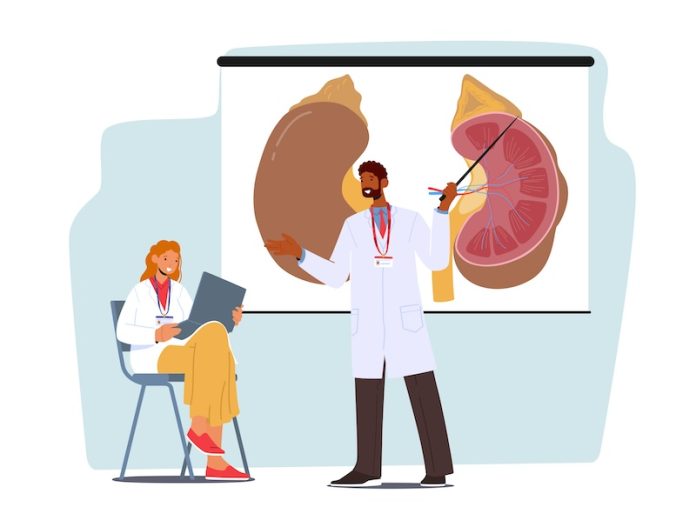
Kidney disease occurs when the kidneys, which filter waste and excess fluids from the blood, become damaged and can’t perform their vital functions properly.
When kidney function declines significantly, it can lead to end-stage renal disease (ESRD), where dialysis or a kidney transplant is typically needed.
However, for many people with early or moderate kidney disease, there are ways to manage the condition without resorting to dialysis. By making lifestyle changes and following medical advice, it’s possible to maintain kidney function and improve quality of life.
Diet plays a crucial role in managing kidney disease. A kidney-friendly diet focuses on controlling the intake of certain nutrients to reduce the strain on the kidneys. One key aspect is limiting sodium (salt), which helps control blood pressure and reduces fluid retention.
High sodium levels can make the kidneys work harder and worsen kidney damage. The American Heart Association recommends consuming less than 2,300 milligrams of sodium per day, and for kidney patients, even lower levels may be advised.
Protein intake is another important factor. While protein is essential for health, excessive amounts can put extra stress on the kidneys.
The National Kidney Foundation suggests that people with kidney disease consume a moderate amount of protein, tailored to their level of kidney function and nutritional needs. Lean meats, fish, and plant-based proteins like beans and lentils are good choices.
Managing potassium and phosphorus levels is also vital. These minerals can build up in the blood when kidneys aren’t functioning well, leading to serious health issues. Foods high in potassium, like bananas, oranges, and potatoes, should be consumed in moderation.
Similarly, foods high in phosphorus, such as dairy products, nuts, and certain meats, should be limited. Phosphate binders, which are medications that help prevent phosphorus absorption from food, can be prescribed to help control phosphorus levels.
Maintaining a healthy weight through regular physical activity is beneficial for overall health and can help manage kidney disease. Exercise helps lower blood pressure, control blood sugar levels, and reduce the risk of heart disease, all of which are important for kidney health.
The Centers for Disease Control and Prevention (CDC) recommends at least 150 minutes of moderate-intensity aerobic activity per week, combined with muscle-strengthening activities on two or more days a week.
Controlling blood pressure and blood sugar is critical in managing kidney disease, especially for those with diabetes or hypertension, which are leading causes of kidney damage.
Medications like ACE inhibitors or angiotensin II receptor blockers (ARBs) are often prescribed to help lower blood pressure and protect the kidneys. Regular monitoring and keeping blood pressure within the target range set by a healthcare provider can slow the progression of kidney disease.
Managing diabetes effectively is essential for protecting kidney function. This involves monitoring blood sugar levels, taking prescribed medications, and following a healthy diet.
The American Diabetes Association emphasizes the importance of keeping blood sugar levels within the recommended range to prevent complications, including kidney damage.
Staying hydrated is important, but people with kidney disease need to balance fluid intake carefully. While drinking enough water helps the kidneys function, too much fluid can lead to swelling and high blood pressure.
Healthcare providers can give specific guidance on the right amount of fluid based on individual kidney function and overall health.
Regular medical check-ups and blood tests are essential for monitoring kidney function and making necessary adjustments to treatment plans.
Tests such as the glomerular filtration rate (GFR) and urine albumin-to-creatinine ratio (UACR) help assess kidney function and detect early signs of worsening disease. Early intervention and timely adjustments to treatment can prevent further damage and delay the need for dialysis.
In summary, managing kidney disease without dialysis involves a combination of dietary changes, regular physical activity, controlling blood pressure and blood sugar, staying hydrated, and frequent medical monitoring.
By adopting these strategies and working closely with healthcare providers, many people with kidney disease can maintain their kidney function and lead a healthier life.
Making these lifestyle changes and following medical advice can significantly improve outcomes and quality of life for individuals with kidney disease.
If you care about kidney health, please read studies about how to protect your kidneys from diabetes, and drinking coffee could help reduce risk of kidney injury.
For more information about kidney health, please see recent studies about foods that may prevent recurrence of kidney stones, and eating nuts linked to lower risk of chronic kidney disease and death.
Copyright © 2024 Knowridge Science Report. All rights reserved.



